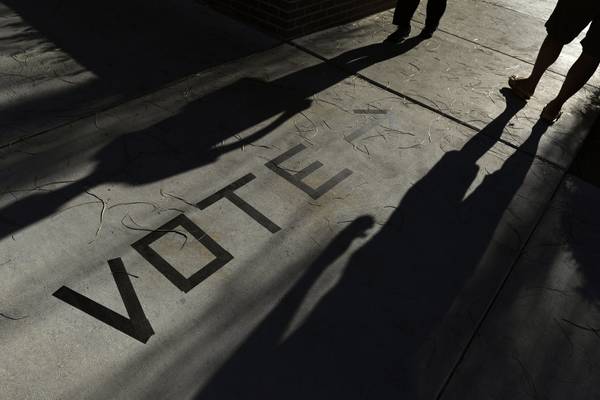Related news
- Democrat Rosen ousts GOP’s Heller from Nevada Senate seat
- Gov.-elect Steve Sisolak says, ‘We will be one Nevada’
- Nevada ballot questions: Voters reject breaking up NV Energy, pass Marsy’s Law
- Nevada brothel owner who unexpectedly died still wins Assembly seat
- Energized Latino, young voters bode well for Democrats long-term
Nevada voters have rejected a hotly contested and expensive ballot initiative that backers characterized as open-market energy choice, while opponents led by the state's dominant electric utility said would lead to dangerous deregulation.
Nevadans opted to oppose Question 3, formally known as the Energy Choice Initiative, which would have broken up the monopoly system that NV Energy has on the market by amending the state constitution. The amendment would have switched the state to a competitive retail model in the generation of power here.
“The results are in: Question 3 has been defeated,” the No on 3 Twitter account posted shortly after midnight. “Thank you to voters for taking the time to look into the facts on this risky and costly proposal. We couldn’t have done this without you.”
The result is a stark difference from 2016 when voters overwhelming sided with measure with 72 percent of the vote. It needed to be approved again Tuesday for it to become law.
The ballot measure was the most expensive contest in Nevada history, pulling in nearly $100 million in campaign contributions.
The Coalition to Defeat Question 3 raised $63.6 million, with $62.8 million coming from NV Energy.
Political action committee Nevadans for Affordable, Clean Energy Choices raised $33.4 million in support of the measure, with $21.9 million coming from Las Vegas Sands.
Disappointed by the result, backers of the measure said they won’t stop fighting for a competitive energy model despite the defeat.
“We know that competition in our energy markets drives prices down and provides more renewable energy choices,” said Dave Chase, campaign manager for Yes on 3 in a statement. “But the fact is, NV Energy spent more money opposing Question 3 than anyone has ever spent in the history of Nevada politics. We are disappointed with the results of this election and will continue this fight until Nevadans have the right to choose affordable, clean energy.”
Motor Voter ballot question OK'd
Nevada voters have approved making voter registration automatic when a person applies for a driver's license or identification card.
Question 5 passed Tuesday to change what amounted to an opt-in system at the state Department of Motor Vehicles to an opt-out rule. That means a person will have to check a box to decline voter registration.
If a person is already registered to vote, his or her voter registration information will be automatically updated.
A 2016 petition drive led the Legislature to approve the law, with Democrats and Republicans voting on party lines.
Republican Gov. Brian Sandoval vetoed it, saying voters should decide for themselves whether to register, not the government.
Proponents including the American Civil Liberties Union of Nevada spent about $10 million on the campaign.
Renewables question advances
Nevadans have advanced an initiative to speed the pace and raise the bar on the amount of electricity generated from renewable energy sources in one of the nation's sunniest states.
Question 6 won initial approval Tuesday but must pass again in 2020 to take effect. It aims to amend the state constitution to raise the minimum amount of power that electric utilities generate or acquire from solar, wind or geothermal sources to 50 percent in 2030.
The current benchmark is 25 percent by 2025. The state's dominant electric utility, NV Energy, says it already has a 24 percent clean-energy portfolio.
Proponents have been underwritten by California billionaire Democratic activist Tom Steyer, founder of the group NextGen Climate Action.
Opponents say free-market forces and the Legislature should set the state standard.
Marsy's Law cleared
Nevada voters have approved a ballot measure to embed crime victims' rights in the state constitution.
Question 1 passed on Tuesday. It was described by backers as Marsy's Law for Nevada.
The name refers to a 2008 law enacted by voters in California with support from billionaire Henry Nicholas in memory of his slain sister, Marsalee "Marsy" Nicholas. She was killed by her ex-boyfriend in 1983.
The Nevada measure was approved by the state Legislature in 2015 and 2017. It expands the definition of a victim and lists 16 rights including privacy, protection from a defendant, refusal of interview or deposition requests without a court order, notice of court and parole hearings and "full and timely restitution."
Opponents called the proposal redundant, costly and vague.
Voters OK medical equipment tax relief
Nevadans have passed a measure granting tax exemption for prescription medical equipment such as oxygen tanks, sleep apnea monitors, wheelchairs and hospital beds.
Nearly three-fourths of voters gave the measure initial approval in 2016. But as a constitutional amendment, it required a second statewide vote, which it received on Tuesday.
Supporters called taxes on medical equipment unfair to sick, injured or dying Nevadans who pay directly or through higher insurance premiums.
Opponents argued that basic budget principles mean the state can't afford giveaways and that public services will be hurt by lost tax revenue.
The measure had financial backing from Bennett Medical Services, a Reno company with products that will be exempt from taxes. Company owner Douglas Bennett launched the initiative after the idea failed in the state Legislature.
The Associated Press contributed to this report.

